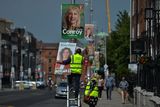Colm McCarthy: 'State broadcaster struggles with challenges of the modern world'
Perhaps it would be simpler to scrap the licence fee and assist public service media directly from the Exchequer, writes Colm McCarthy
'Since the TV licence fee had become almost like a poll tax — virtually every household is liable for €160 per annum — it was always a regressive tax' (stock photo)
The latest revelation of money troubles at RTE is hardly a surprise. The state broadcaster is dual-funded, through the TV licence fee and whatever advertising revenue it can generate. Both income streams have weakened, through evasion of the licence fee and leakage of ad revenue to the social media platforms. RTE's director general, Dee Forbes, was not exaggerating when she warned of an existential threat to public service broadcasting, but the private radio and TV stations, which rely almost entirely on advertising, are in an even worse pickle. They get almost nothing from the licence fee which yields €180m per annum to RTE. Some are mostly music stations but several also deliver news and current affairs and they have been laying off staff. The print media have lost both readers and advertisers to the online platforms and the threat is not just to RTE but to all traditional vehicles of broadcast and print journalism.
The Government reiterated last Thursday its willingness to consider some form of successor to the licence fee. Since television can now be accessed through laptops and smartphones and may shortly be available through the buckle on your belt, the definition of a TV set just doesn't work any more.
Join the Irish Independent WhatsApp channel
Stay up to date with all the latest news















